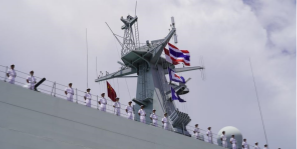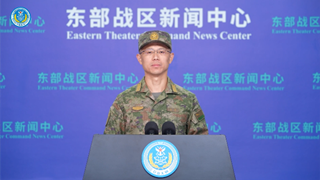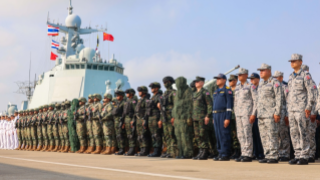By Chen Hong
Recently, Australian media revealed that an Australian Navy warship, when operating near the so-called Japan's exclusive economic zone last week, experienced the use of sonar pulses by a PLA Navy warship which endangered the safety of their divers. Under the media hype and pressure of some domestic political forces, Australian Defence Minister Richard Marles and Prime Minister Anthony Albanese successively made statements censuring that the behavior of the Chinese military was "dangerous and unprofessional." In this regard, the Chinese Defense Ministry spokesman clearly stated that Australia's claims "completely untrue", reiterating that there is no demarcation between China and Japan in the relevant waters and that China's military activities did not take place within or enter Japan's exclusive economic zone. He also urged the Australian side to respect the facts, stop making reckless and irresponsible accusations against China.
Such accusations by the Australian side are utterly nonsensical and ludicrous. First, sonar is not an offensive weapon but rather an underwater detection tool, which is widely used in ocean mapping, seabed terrain and ocean current detection, fish tracking and ship communication monitoring. If the Chinese warship's objective was genuinely aggressive in nature, sonar wouldn’t be a choice. Second, the fully armed Australian navy frigate HMAS Toowoomba traveled long to the waters near China, which made the Chinese Navy vigilant about their behavior and intentions. Conducting detection and validation is a natural, normal and legitimate response from a sovereign state. Third, sonar emits ultrasonic waves. Unless there is prolonged and high-intensity direct exposure to sonar, the consequences for the human body are minimal. In fact, whales, dolphins and some marine mammals also have biological sonar mechanisms that emit ultrasonic waves underwater for distance detection and prey tracking. To this end, it is truly unprofessional to hype up the side effects of sonar.
The incident came at a time when Australia's relations with China are at a critical juncture of overall improvement. Since taking office in May 2022, the Albanese government has taken the initiative to break with the blind anti-China policies of its predecessor and actively adjusted and improved relations with China. The Chinese side responded positively to this and the two sides set about to properly resolve the disputes and controversies between them in a pragmatic spirit. Following several years of ups and downs, the relationship between the two countries has finally begun to regain stability.
At the beginning of November, Albanese paid an official visit to China and achieved important results by firmly standing up against distractions and various pressures. Some anti-China forces in certain countries including Australia are obviously not reconciled at this. They distorted and exaggerated the maritime encounter between Chinese and Australian navies, fabricated the so-called China threat theory and incited hostility towards China, in an attempt to obstruct the improvement and development of China-Australia relations.
Meanwhile, the US continuously promoted the “Indo-Pacific strategy” in recent years with the aim to contain, hinder and undermine the peaceful development of China. The US constantly coerces some countries including Australia, and extends, delivers and deploys their military forces to China's surroundings, wooing them to serve its own hegemonic profits recklessly.
Should these countries continue to send military forces to China's neighborhood by completely sacrificing their diplomatic and security autonomy and submitting to Washington's instructions and manipulations, China will definitely respond resolutely to such provocations to protect the national sovereignty.
More provocations from the Austrian side will inevitably incur more self-defense responses from China and increase the probability of disputes between them. Therefore, rational and wise politicians in Australia should strive to avoid creating confrontation and conflicts and maintain regional stability and security.
At present, China-Australia relations have undergone a distinct positive change and are transitioning from thawing to warming up. This achievement did not come easily and requires both parties to cherish and maintain it together. The improvement and development of China-Australia relations serves the interests of the two countries and their peoples and is conducive to peace, stability and prosperity in the Asia-Pacific region.
Anti-China forces within and outside Australia constantly stir up trouble and clamor the retroactive rhetoric, attempting to undermine the steadily progressing relations with China by unscrupulously taking advantage of the Albanese government. It should indeed be the consensus of both sides that their bilateral relations cannot tolerate any more disruptions or backtrack again.
(The author is the director with Australian Studies Centre, East China Normal University)
Editor's note: Originally published on huanqiu.com, this article is translated from Chinese into English and edited by the China Military Online. The information and opinions in this article do not necessarily reflect the views of eng.chinamil.com.cn.









